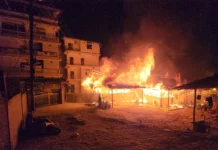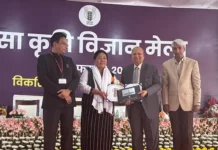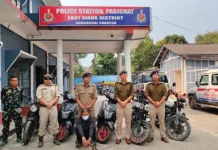[ Tongam Rina ]
ITANAGAR, Sep 18: “I was scared of being thrown out of the rented house if I tested positive for Covid-19, so I did not get tested, although I had all the symptoms,” says a 26-year-old self-employed man who stays alone in Itanagar. He had slight fever and cough, and had lost his sense of smell. These are all symptoms of Covid-19, according to the World Health Organization, but there is no way of knowing if he had the virus since he did not get himself tested. He took the help of a friend to buy medicines and self-isolated himself for over 20 days.
A family of four fell ill with Covid-19 symptoms around the same time, in the second week of September. None of them got themselves tested because they heard via social media that a test costs Rs 2,400.
“We don’t have so much money,” one of the family members says.
They had no idea that a rapid antigen test (RAT) costs Rs 500 for non-APSTs and Rs 250 for APSTs and state and central government employees.
They say that they would consider getting tested to be sure that they are not Covid-19 positive if the rate of testing is lesser than Rs 500.
While some opted out of testing because of stigma and costs, there is another group of people who do not want to get themselves tested.
“I convinced my parents to let me get treated in the house as I was not sure what to expect in a Covid care centre. I have read many negative things about food and hygiene on social media and being left alone without anyone to check on me would make it worse for me,” she says.
A government employee, she had earlier tested negative but developed symptoms a week later. Two of her colleagues tested positive but her name did not figure in the list of primary contacts after they tested positive. She did not go back for testing. Instead she chose to self-isolate.
Health Services Director Dr M Lego says that the department is aware of people who are symptomatic not voluntarily turning up for tests because of the stigma attached.
“Concealment will not help the state in its fight against the pandemic. The health department is doing everything possible, so it is on the citizens to come forward to get tested for the safety of themselves and others,” he said, speaking to this daily.
“Unless there is cooperation of the citizens, the health department alone will not be able to contain the spread of the virus,” Dr Lego said, and appealed to everyone to come forward to get themselves tested.
He further said that there is a huge amount of misinformation being circulated on social media.
“One may have the virus but still be asymptomatic; therefore, for the safety of the elderly and those with comorbidity, who are the most vulnerable to the virus, it is essential that people are tested,” he said.
Itanagar Capital Region (ICR) DMO Dr Mandip Perme says that people who are not willing to get tested and are hiding their symptoms and conditions are only weakening the health department’s effort to “save the community and people with comorbidity who have higher risk of getting infected.”
The ICR has seen the highest number of cases at 2,316, with 690 active cases as on Friday in the state. The figure for the state is 7,005 positive cases.
Dr Perme says that the capital region is in the “high wave” of infection. He cites lack of public support and violation of SOPs as the reasons for the recent spike in the cases since Unlock 4 began.
“We are trying every bit possible to keep the virus as contained as possible, but due to lack of public support and violation of SOPs and social distancing, it’s getting worse,” he said.
He blames the stigma attached to the virus as one of the reasons for people not volunteering to get tested. Dr Perme says that the department is concerned and understands the reluctance of people who are symptomatic and need to go for RT-PCR test as some may not be able to afford it.
He says that the health department is thinking about “further proposing to make the test free for symptomatic patients.”
President of the Arunachal chapter of the Indian Medical Association, Dr Lobsang Tsetim says that the people should not take the virus lightly and should get tested.
“Now the virus is in the community and everyone is vulnerable. Two health workers have already succumbed to the disease,” he says.
Thirteen people have died of the virus in the state.
Dr Tsetim says that there is a misconception that all those who are tested come out with positive results. In contradiction to the popular belief and fear that everyone who gets tested is positive, the statistics of Arunachal say otherwise. According to the health department a total of 2,18,285 persons were tested, out of whom 7,005 tested positive.
Dr Tsetim says that the government has done whatever possible, but it does require people’s cooperation to stop the virus from spreading.
He says that the spread of the virus is in the community stage, and that even children and elderly are testing positive. Dr Tsetim says that mortality will increase if people are not careful.
“Wear masks and wash hands frequently, maintain social distancing and avoid crowded places,” Dr Tsetim says. “No one is immune to the virus.” (Three Covid-19 positive people quoted in this report spoke on condition of anonymity.)
Charges for Covid-19 tests
# RAT @ Rs 500 per test (for non-APSTs)
# RAT @ Rs 250 per test (for APSTs and central and state government employees)
# RT-PCR/TrueNat @ Rs 2,000 per test (for APSTs and central and state government employees)
# RT-PCR/TrueNat @ Rs 2,400 per test (for non-APSTs)
Exemption of charges for testing
# BPL card holders of the state should produce BPL cards.
# Elders above 60 years old and children below 10 years old.
# Government servants on official duty.




